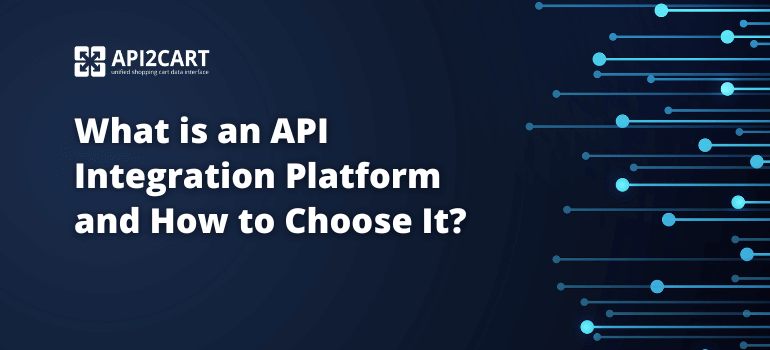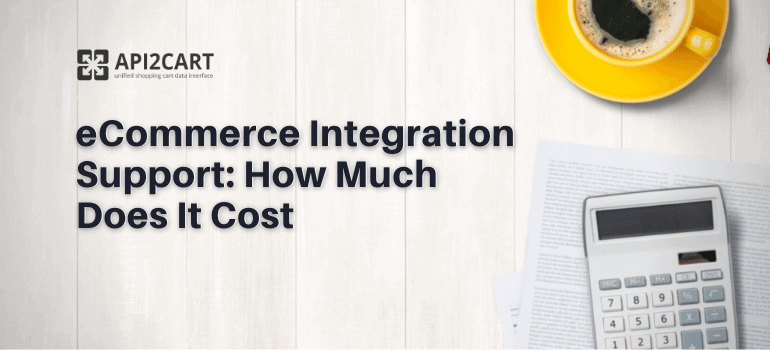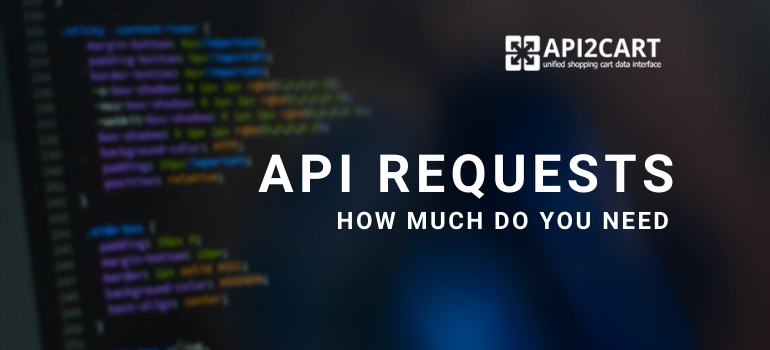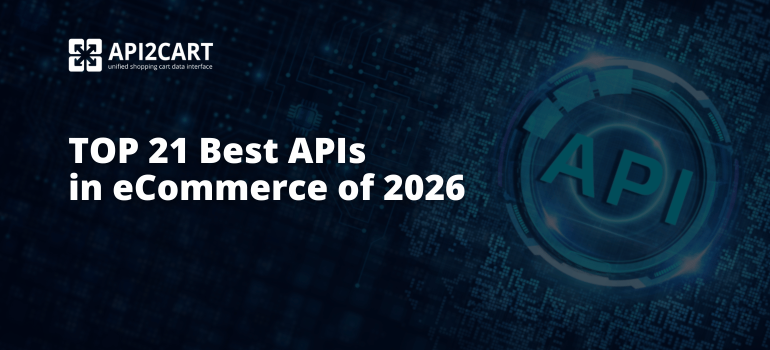
In today's digital world, APIs (Application Programming Interfaces) are the backbone of seamless software integration and innovation. They power essential business operations, improve user experience, and connect platforms smoothly. eCommerce integration makes these connections possible. Generally, it is crucial for developers who create software for order management, inventory syncing, and payment processing. That's why we've compiled this list of the 21 best APIs in 2026 that help developers speed up integration, enhance functionality, and deliver exceptional digital experiences.
The global API management market size was valued at USD 5.42 billion in 2024. The market is projected to grow from USD 6.89 billion in 2025 to USD 32.77 billion by 2032, exhibiting a CAGR of 25.0% during the forecast period. Fast development and business growth are possible with the best APIs which help integrate multiple platforms and services.
In this article, we'll explore the top 21 best APIs of 2026. Also, we'll learn what these APIs provide and how how they can be used by software developers to build and develop effective, scalable and reliable eCommerce solutions.
The Top 21 Best APIs in eCommerce for 2026
Here's our selected list of the 21 best APIs in eCommerce for 2026, which reflects their unique features and benefits for software developers:
1. API2Cart unified API
The API2Cart unified API is the solution for software developers, which allows them to connect and manage data of several eCommerce platforms and marketplaces through one integration point. Basically, this is very useful to software developers who are working on solutions for eCommerce automation, inventory management, order processing and such services.
API2Cart provides a single API that helps software providers to integrate with 60+ eCommerce platforms and marketplaces, including Shopify, Magento, WooCommerce, BigCommerce, Amazon, OpenCart, Etsy, Wix, PrestaShop, Shopee, Temu, TikTok Shop, Flipkart, and many others, at once - all through a single integration. It provides access to 100+ API methods to get, add, update, and sync store data about products, orders, customers, shipments, and categories. With this integration, you can easily access, sync and manage all valuable store data like products, orders, customers, inventory, shipments, and more, across multiple eCommerce platforms, in real-time.
Here is how the response structure of order.list method for API integration looks like:
{
'return_code': 0,
'return_message': 'string',
'pagination': {
'previous': 'string',
'next': 'string',
'additional_fields': {},
'custom_fields': {}
},
'result': {
'orders_count': 0,
'order': [
{
'id': 'string',
'order_id': 'string',
'basket_id': 'string',
'channel_id': 'string',
'customer': {
'id': 'string',
'email': 'string',
'first_name': 'string',
'last_name': 'string',
'phone': 'string',
'additional_fields': {},
'custom_fields': {}
},
'create_at': {
'value': 'string',
'format': 'string',
'additional_fields': {},
'custom_fields': {}
},
'currency': {
'id': 'string',
'name': 'string',
'iso3': 'string',
'symbol_left': 'string',
'symbol_right': 'string',
'rate': 0,
'avail': true,
'default': true,
'additional_fields': {},
'custom_fields': {}
},
'shipping_address': {
'id': 'string',
'type': 'string',
'first_name': 'string',
'last_name': 'string',
'postcode': 'string',
'address1': 'string',
'address2': 'string',
'phone': 'string',
'phone_mobile': 'string',
'city': 'string',
'country': {
'code2': 'string',
'code3': 'string',
'name': 'string',
'additional_fields': {},
'custom_fields': {}
},
'state': {
'code': 'string',
'name': 'string',
'additional_fields': {},
'custom_fields': {}
},
'company': 'string',
'fax': 'string',
'website': 'string',
'gender': 'string',
'region': 'string',
'default': true,
'tax_id': 'string',
'identification_number': 'string',
'alias': 'string',
'additional_fields': {},
'custom_fields': {}
},
'billing_address': {
'id': 'string',
'type': 'string',
'first_name': 'string',
'last_name': 'string',
'postcode': 'string',
'address1': 'string',
'address2': 'string',
'phone': 'string',
'phone_mobile': 'string',
'city': 'string',
'country': {
'code2': 'string',
'code3': 'string',
'name': 'string',
'additional_fields': {},
'custom_fields': {}
},
'state': {
'code': 'string',
'name': 'string',
'additional_fields': {},
'custom_fields': {}
},
'company': 'string',
'fax': 'string',
'website': 'string',
'gender': 'string',
'region': 'string',
'default': true,
'tax_id': 'string',
'identification_number': 'string',
'alias': 'string',
'additional_fields': {},
'custom_fields': {}
},
'payment_method': {
'name': 'string',
'additional_fields': {},
'custom_fields': {}
},
'shipping_method': {
'name': 'string',
'additional_fields': {},
'custom_fields': {}
},
'shipping_methods': [
{
'name': 'string',
'additional_fields': {},
'custom_fields': {}
}
],
'status': {
'id': 'string',
'name': 'string',
'history': [
{
'id': 'string',
'name': 'string',
'modified_time': {
'value': 'string',
'format': 'string',
'additional_fields': {},
'custom_fields': {}
},
'notify': true,
'comment': 'string',
'additional_fields': {},
'custom_fields': {}
}
],
'refund_info': {
'shipping': 0,
'fee': 0,
'tax': 0,
'total_refunded': 0,
'time': {
'value': 'string',
'format': 'string',
'additional_fields': {},
'custom_fields': {}
},
'comment': 'string',
'refunded_items': [
{
'product_id': 'string',
'variant_id': 'string',
'order_product_id': 'string',
'qty': 0,
'refund': 0,
'additional_fields': {},
'custom_fields': {}
}
],
'additional_fields': {},
'custom_fields': {}
},
'additional_fields': {},
'custom_fields': {}
},
'totals': {
'total': 0,
'subtotal': 0,
'shipping': 0,
'tax': 0,
'discount': 0,
'additional_fields': {},
'custom_fields': {}
},
'total': {
'subtotal_ex_tax': 0,
'wrapping_ex_tax': 0,
'shipping_ex_tax': 0,
'total_discount': 0,
'total_tax': 0,
'total': 0,
'total_paid': 0,
'additional_fields': {},
'custom_fields': {}
},
'discounts': [
{
'code': 'string',
'value': 0,
'type': 'string',
'additional_fields': {},
'custom_fields': {}
}
],
'order_products': [
{
'product_id': 'string',
'order_product_id': 'string',
'model': 'string',
'name': 'string',
'price': 0,
'price_inc_tax': 0,
'quantity': 0,
'discount_amount': 0,
'total_price': 0,
'tax_percent': 0,
'tax_value': 0,
'tax_value_after_discount': 0,
'options': [
{
'option_id': 'string',
'name': 'string',
'value': 'string',
'price': 0,
'weight': 0,
'type': 'string',
'product_option_value_id': 'string',
'additional_fields': {},
'custom_fields': {}
}
],
'variant_id': 'string',
'weight_unit': 'string',
'weight': 0,
'barcode': 'string',
'parent_order_product_id': 'string',
'additional_fields': {},
'custom_fields': {}
}
],
'bundles': [
{
'product_id': 'string',
'order_product_id': 'string',
'model': 'string',
'name': 'string',
'price': 0,
'price_inc_tax': 0,
'quantity': 0,
'discount_amount': 0,
'total_price': 0,
'tax_percent': 0,
'tax_value': 0,
'tax_value_after_discount': 0,
'options': [
{
'option_id': 'string',
'name': 'string',
'value': 'string',
'price': 0,
'weight': 0,
'type': 'string',
'product_option_value_id': 'string',
'additional_fields': {},
'custom_fields': {}
}
],
'variant_id': 'string',
'weight_unit': 'string',
'weight': 0,
'barcode': 'string',
'parent_order_product_id': 'string',
'additional_fields': {},
'custom_fields': {}
}
],
'modified_at': {
'value': 'string',
'format': 'string',
'additional_fields': {},
'custom_fields': {}
},
'finished_time': {
'value': 'string',
'format': 'string',
'additional_fields': {},
'custom_fields': {}
},
'comment': 'string',
'store_id': 'string',
'warehouses_ids': [
'string'
],
'refunds': [
{
'id': 'string',
'shipping': 0,
'fee': 0,
'tax': 0,
'total': 0,
'modified_time': {
'value': 'string',
'format': 'string',
'additional_fields': {},
'custom_fields': {}
},
'comment': 'string',
'items': [
{
'product_id': 'string',
'variant_id': 'string',
'order_product_id': 'string',
'qty': 0,
'refund': 0,
'additional_fields': {},
'custom_fields': {}
}
],
'additional_fields': {},
'custom_fields': {}
}
],
'gift_message': 'string',
'order_details_url': 'string',
'additional_fields': {},
'custom_fields': {}
}
],
'additional_fields': {},
'custom_fields': {}
},
'additional_fields': {},
'custom_fields': {}
}
API2Cart helps in cutting the amount of time and money spent to create and support specific integrations by building and maintaining individual integrations for each platform. Using this single API, one of 21 best APIs, software developers can improve their integration strategies, expand their target audience, and improve the value of their services to eCommerce stores.
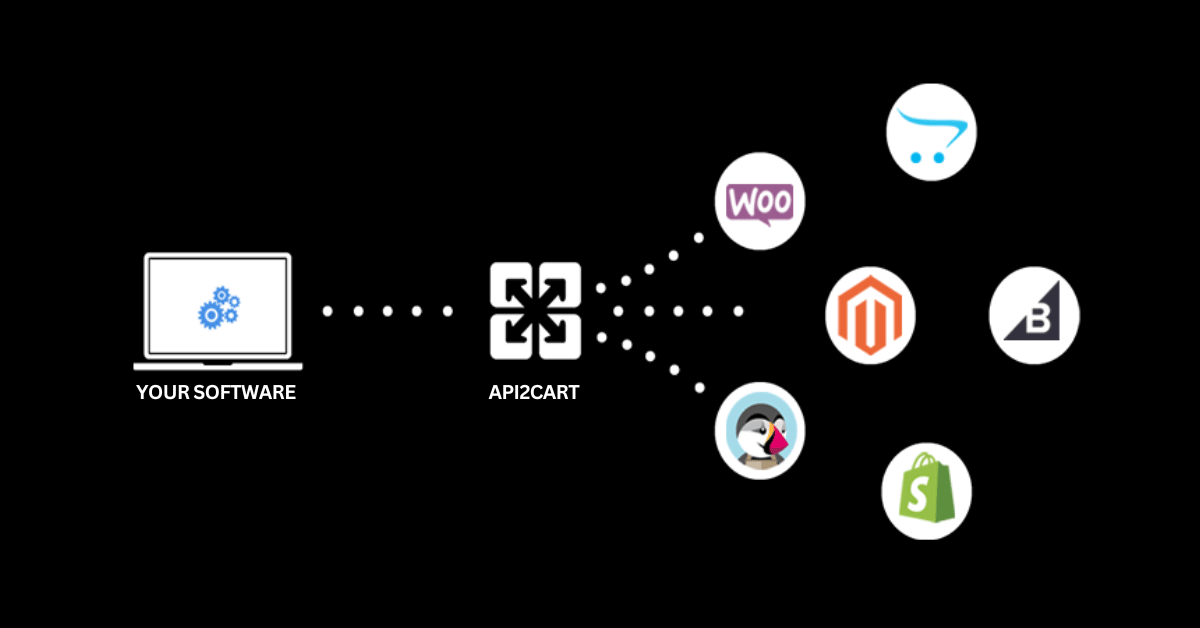
2. Shopify API:
Shopify API is a suite of tools provided by Shopify which empowers Shopify software developers to extend and customize Shopify store's functionality. It allows for a quick and easy integration into other software applications, systems, programs, digital products and platforms for product, order, customer etc. management. Shopify API supports both REST and GraphQL format and provides freedom to retrieve and manipulate data. Also, it allows software developers to fetch product data, build shopping carts and process checkouts. Also, Shopify API lets software providers access and store data from Shopify. It uses XML and JSON formats. The data is transferred with HTTP requests, such as GET, POST, PUT, and DELETE.
In summary, Shopify APIs give software developers the chance to create the shopping experience specifically according to the business needs. It helps to automate routine tasks, such as inventory management and even order processing improving operational efficiency. Shopify API is a great way to merge with third-party services such as payment gateways, shipping providers and marketing tools. The API can be used by large businesses, as well as small startups to help them grow and expand.
3. WooCommerce API:
WooCommerce API a set of programming interfaces offered by WooCommerce, a popular plugin eCommerce for WordPress. It allows software developers to interact with WooCommerce stores programmatically, allowing developers to perform tasks on managing products, orders, customers and other such store data. The WooCommerce REST API uses the REST principles and supports CRUD (Create, Read, Update, Delete) easily via HTTP methods.
JSON format is used to exchange data, so that it is compatible with different programming languages and platforms. Basically, multiple authentication methods are supported (OAuth 1.0a and basic authentication over HTTPS) and are used to secure access to store your data. It has a wide range of endpoints to handle various data of a WooCommerce store, such as products, orders, customers, coupons and reports. Also, this makes seamless integration of the third-party service, or platform, in such as inventory and the order management, the analytics.
4. Magento API:
The Magento API is the programming interface of Magento. Magento is an open-source eCommerce solution. Generally, it provides methods for software developers to communicate with Magento stores. Generally, these APIs help in managing of products, orders, customers and other data of the store in the interfacing with third-party services. Magento uses both REST and SOAP API types which are the best types of APIs depending on the project. Also, it provides HTTP methods, such as GET, POST, PUT and DELETE to collect data. These best APIs give you full control over store operations by providing access to many store entities, including products, categories, customers, orders and inventories.
Thus, Magento APIs allow third-party applications and services to authenticate through OAuth 1.0a, in addition to token and session based authentication. The platform is flexible enough to enable software developers to create custom APIs or extend existing ones to fill a particular business need.
5. BigCommerce API:
BigCommerce API is a comprehensive set of tools for software developers to interact programmatically with the BigCommerce platform. It helps you to build custom applications, integrations and functionality that add power and extend BigCommerce stores. Also, it is used by 150K+ merchants worldwide to retrieve store catalogs, create new stores, set up automation, and troubleshoot issues.
BigCommerce offers REST and GraphQL API to ensure you get the data in the required format. REST API works best for standard CRUD (Create, Read, Update, Delete) but the GraphQL API streamlines more efficient and precise data querying. There are many endpoints for products, orders, customers, categories, etc., all available via the API. The extensive coverage provides the ability to manage and customize stores completely.
6. PayPal API:
PayPal API is a set of programming interfaces. It is provided by PayPal to software developers. These interfaces help integrate PayPal's payment processing and related services into software applications, systems, programs, digital products, and other platforms. These APIs help software developers process payments, manage transactions, conduct subscriptions, and see account information.
PayPal's APIs are REST-based APIs, and developers can perform Create, Read, Update, Delete (CRUD) operations using standard HTTP methods. OAuth 2.0 is used to secure the APIs for data access and to be with the industry standards. JSON format is used to exchange data, so data can be exchanged between different programming languages and platforms. This API, one of the 21 best APIs, has many endpoints. They help manage different aspects of payment processing. These include orders, payments, subscriptions, invoicing, and more.

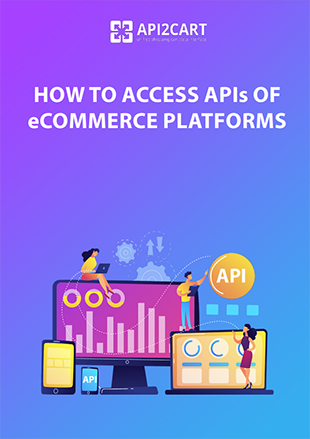
Wait!
Want to learn how to access and work with eCommerce platform APIs more effectively?
Download our free guide and discover the key steps for building integrations and accessing store data via APIs.
7. Stripe API:
Stripe API is a set of application programming interfaces released by Stripe, an online payment processing giant. It allows software developers to include payment processing functionality into software applications, systems, programs, services and digital products. Also, it simplifies different tasks, such as payment and subscription management, customer and financial transactions.
Stripe API is based on RESTful principles, it has resourceful and predictable URLs, standard HTTP verbs and response codes. Basically, all the API responses are JSON encoded so that it's easier for different programming languages and applications. Stripe customer libraries are available for multiple programming languages, such as Python, Java, PHP & Node.js, Go, Ruby and NET. Payment processing can be regulated through various resources provided by this API, including charges, customers, subscriptions, invoices, and much more. Stripe also supports webhooks, which send information about events, such as successful payments, or changes in subscriptions to your software application, system, or program.
8. Square API:
Square API is a programming interface provided by Square, which is also a payment and financial services firm. Also, Square's payment processing and business solutions can be easily integrated into software applications, systems or programs to perform payment processing, order management, customer information, etc.
So, this API enables software developers to settle payments, issue refunds and to handle complaints. Also, it supports credit cards, digital wallets, as well as directly paying in person. It is used to create and track orders for itemizing and fulfilling them. Basically, this API will be very useful for businesses that require recording of the sales transactions. Offers features for the administration of all a company's libraries of items, such as products, services, and prices. Also, it supports complex structures of a catalog and variations. Also, it provides efficient handling of customer data. Customer information is stored and can be accessed by businesses. This helps track purchase patterns and improves customer relations.
9. Amazon Pay API:
Amazon Pay API is a set of APIs offered by Amazon that allows software developers to use Amazon's payment services on their software applications, systems and programs. Also, this integration enables customers to shop with their credentials from their Amazon account making the buying process easier and improving the customer experience.
By using Amazon Pay, software developers simplify the payment process for consumers, and increase conversion rates. Customers can make the transactions while using their existing account details from Amazon, minimizing the time they take during the check out. Amazon Pay utilizes all of Amazon's security measures to safeguard both the merchant and the buyer, regarding payment details. As a result, the API can be used on different platforms, software applications, and digital products. Also, it works with voice-enabled devices. This makes it very flexible for businesses.
10. QuickBooks Commerce API:
QuickBooks Commerce API is a suite of programming interfaces that allows software developers to integrate and interact fully programmatically with QuickBooks Commerce. This API supports managing diverse kinds of business operations, such as inventory control, order processing, product listings, customer data and others through third-party services.
Thus, with this API, one the 21 best APIs, you can manage stock levels, track movements of inventory and synchronize product data on multiple sales channels to always have accurate, up-to-date inventory information. Using this software developers can create, update, and retrieve sales and purchase orders to streamline the process of order management and fulfillment. Generally, by managing products' information, such as price, description, categorizations, in a uniform way, the API makes it possible to have consistent product data on all platforms. With QuickBooks Commerce, businesses can run operations across different sales channels from a single interface.
11. NetSuite API:
NetSuite is a comprehensive cloud-based Enterprise Resource Planning (ERP) suite. It includes Application Programming Interfaces (APIs). Generally, these APIs allow developers to extend, customize, and integrate NetSuite's functionality with other systems, software applications, and programs. These NetSuite APIs make it easy to interact with the underground mechanism of NetSuite's modules, such as financials, Customer Relationship Management (CRM), eCommerce and so on.
Generally, it provides a robust interface for accessing NetSuite records and service that supports create, read, update, delete and comprehensive error handling. REST APIs are introduced to provide a simpler and more efficient integration method, to ensure ease of use and better performance in software applications. Generally, a JavaScript based API which enables software developers to create custom business logic and automate processes on NetSuite. Server and customer side scripting, and scheduled scripting is supported by SuiteScript to enhance your flexibility of customization. Also, it offers a RESTful interface to access NetSuite records and allows writing of CRUD operations on standard and custom records.

12. Amazon API:
Amazon provides a variety of APIs that cover all of its services. They allow software developers to integrate and interact with Amazon's platforms programmatically. These Amazon APIs are used to perform tasks from eCommerce operations to cloud computing, to voice services.
Software developers can use this API to create, publish, maintain, monitor and secure APIs at scale. It has RESTfully, HTTP and WebSocket based APIs that integrate back to multiple backend services. Make language specific APIs for services, such as Amazon S3, EC2, and SimpleDateFormat in order to have a very seamless integration with AWS resources. Additionally, Amazon sellers can access data about their listings, orders, payments, reports and more through a REST based API that makes it easy to manage their eCommerce business.
Also, it allows software developers to use Amazon's product catalog data. They can build and develop software applications, systems, programs, and digital products that list and promote Amazon products. This helps people discover items and become Amazon affiliates. Besides, it allows businesses to connect Amazon's payment processing services with their websites and applications. Customers can use their Amazon account credentials to make transactions. This helps reduce the checkout process.
13. eBay API:
eBay API is a commodious set of Application Programming Interfaces (API) that allow software developers to interact with eBay's platform programmatically. These APIs help software developers create applications and services that handle a wide range of eBay marketplace operations. These things, such as listing items, fetching product information, managing orders and retrieving user data.
eBay provides both RESTful APIs that are lightweight and use standard http method and SOAP based APIs for heavier integrations. They provide a lot of endpoints covering functionality to manage inventory, process orders, marketing and analytics etc. Software developers can build eCommerce solutions and robust applications, systems, and programs that integrate easily with eBay. These APIs use OAuth 2.0 for secure authentication and authorization. And they have provided SDKs (some of the most popular programming languages) and documentation to assist software developers in integrating.
14. Etsy API:
Etsy is a suite of RESTful interfaces from Etsy that allow software developers to programmatically interact with the Etsy platform. It's an Etsy shop management API. It allows you to create software applications, programs, systems, and integrations. These tools help manage most Etsy shop capabilities, including inventory, sales orders, and shop data.
Etsy API enables software developers to create, update, and delete product listings. It allows them to manage inventory quantities and handle product variations. This helps keep better control over shop offerings. It gives endpoints to get the order detail, do transaction processing, and manage fulfillment to stream the sales process. Users can change shop sections, edit shop info and policies to set up a personalized and organized storefront. For safe and industry standard compliant data access, API uses OAuth 2.0 for secure authentication.
15. MailChimp API:
Mailchimp API is a suite of programming interfaces available from Mailchimp to help software developers to integrate and interact with Mailchimp's marketing platform programmatically. Generally, by providing an API, Mailchimp gives software applications and services more possibilities. They can seamlessly integrate with its features. Also, this allows them to automate workflows, manage audiences, and send campaigns.
With this software, software developers can create and manage audiences, add or update subscriber information and segment contacts for targeted marketing efforts. Basically, this API allows us to create, schedule and send email campaigns and replicate or delete campaigns as required. Also, you can set up and manage automated workflows, welcome emails or follow up sequences, according to certain triggers or even events.
16. Klaviyo API:
Klaviyo API is a set of programming interfaces provided by Klaviyo. It gives software developers a way to integrate with Klaviyo's marketing automation platform. They can also operate programmatically within the platform. Using this API, one of the 21 best APIs, helps manage audiences, create and send campaigns, and automate workflows. Basically, it also provides access to analytics. This allows software applications and services to extend their capabilities with an easy integration of Klaviyo's features.
Shortly, this API provides access to detailed performance reports on campaign performance. These include open rates, click-through rates, and other engagement metrics. It helps enable data-driven decision-making. Klaviyo can sync your product data with eCommerce platforms and track purchases, as well as send personalized product recommendations through its API.

17. HubSpot API:
HubSpot API is a suite of programming interfaces offered by HubSpot to allow software developers to programmatically interact with HubSpot's Platform. This API integrates HubSpot's marketing, sales, service, and CRM functionality into other applications. Also, it allows software developers to manage contacts, automate activities, and view analytics. The API connection enables all of these operations.
18. Mollie API:
The Mollie API is a payment integration solution. Basically, it allows software developers to integrate secure and flexible payment processing into websites, applications, and eCommerce platforms. It simplifies handling transactions via a single, software developer friendly API, offering a large number of payment methods. There are many ways to pay, using PayPal, iDEAL, credit cards, and others. Also, it protects your payment details to secure its transactions.
19. Salesforce API:
Salesforce provides a full set of APIs. They allow software developers to interact with its platform in a programmatic way. External systems and software applications can seamlessly connect to Salesforce. Salesforce's APIs allow developers to manipulate data, manage metadata, and receive real-time events.
20. Sendinblue API:
Sendinblue API is a comprehensive RESTful interface that allows software developers to programmatically access and manage all Sendinblue's digital marketing services. Additionally, this includes functionalities, such as email marketing, SMS campaigns, transactional emails, contact management. Additionally, integration with the Sendinblue API allows companies to set up marketing workflows that automatically adapt and personalize for their audience.
21. Sendcloud API:
Sendcloud API is a complete RESTful interface that allows software developers to integrate Sendcloud's shipping and logistics services into their software applications, programs, systems, digital products, or eCommerce platforms. Also, this API automates shipping processes and provides access to many carriers and delivery options across Europe.
Conclusion
In summary, the API landscape is evolving and it is changing how software is built, giving developers tools to build robust, scalable and innovative solutions. However, with the evolving technology you will need to continue to be aware of the latest API trends and capabilities. Generally, for this list of the top best 21 APIs of 2026 we've looked at platforms that are at the top of their game in terms of versatility, functionality, and therefore relevance across all industries. Also, these 21 best APIs showcase how disparate tools can be harnessed by software developers to solve hard problems, streamline work, and enable outstanding user experiences.
Want to unlock the possibilities of seamless integration with 60+ eCommerce platforms and marketplaces? Sign up at API2Cart today and simplify your processes, save development time, money and resources, and enhance your software's capabilities.
FAQs
Fill out the form below to get the guide:

How to Access APIs of eCommerce Platforms
Discover the detailed info about APIs of eCommerce platforms and explore the possible ways of developing the connection with them.
